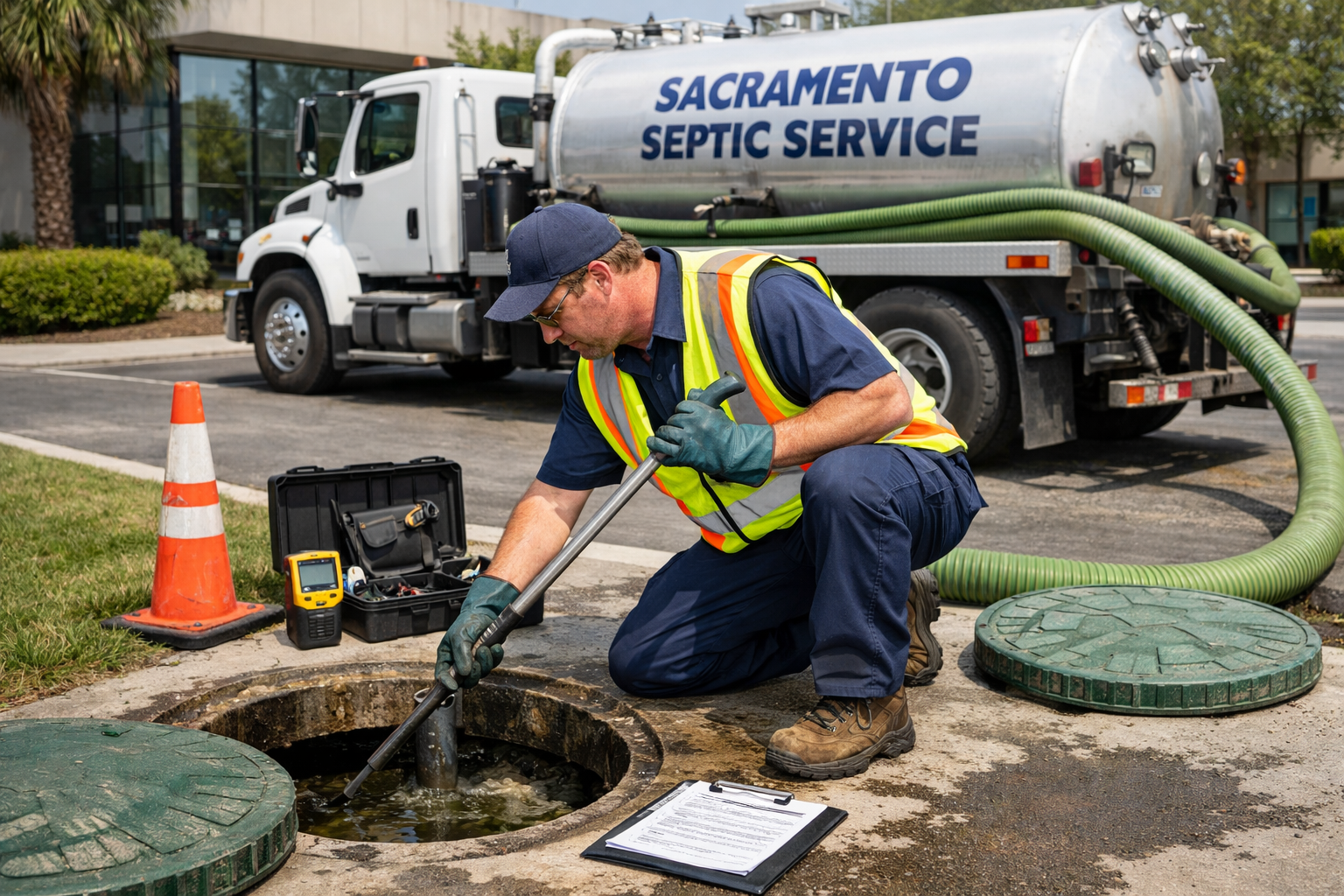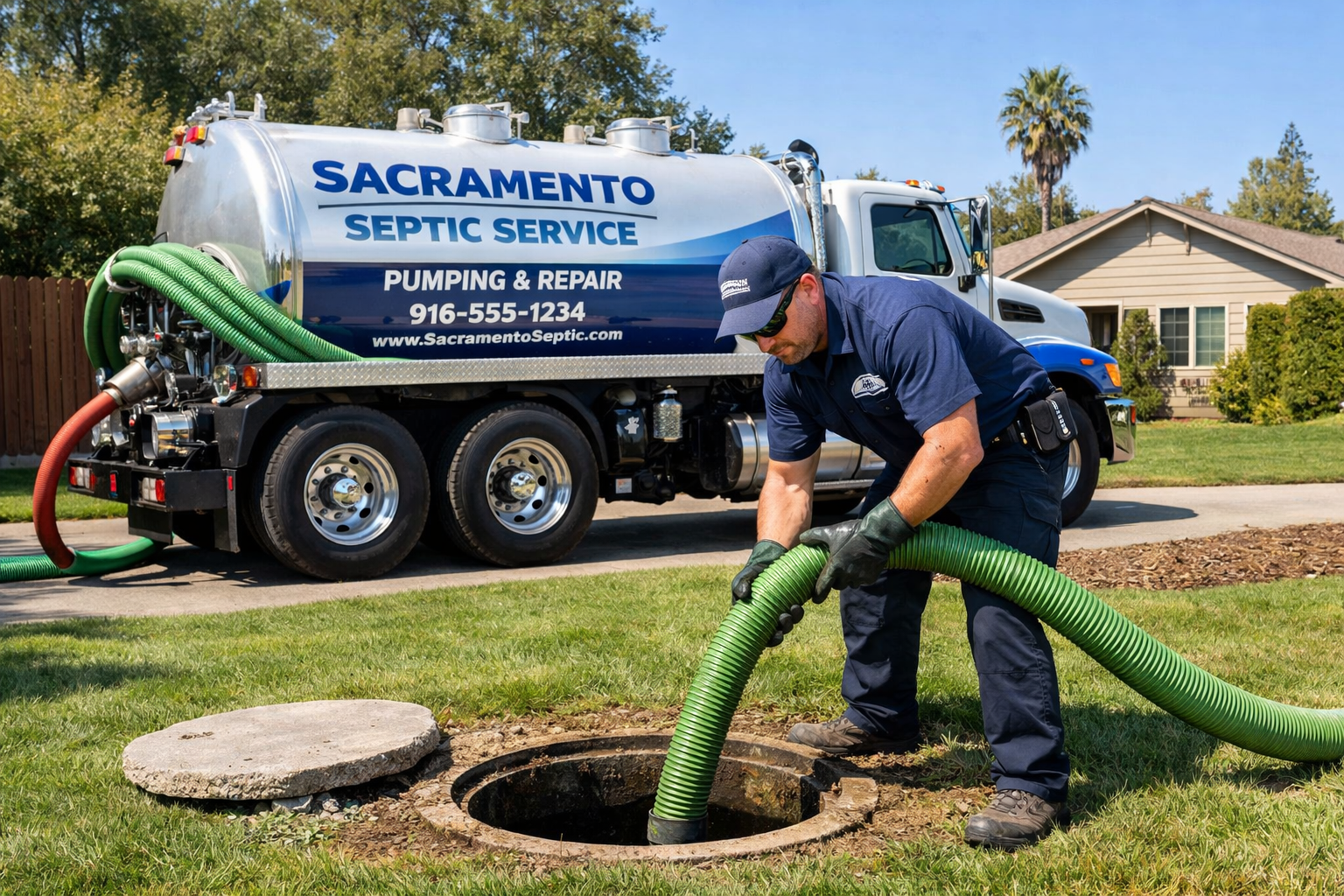If you own a home in Auburn, CA, there’s a good chance you rely on a septic system, but how much do you really know about how it works? Between neighborhood chatter and online advice, it’s easy for myths and half-truths to spread, leaving homeowners confused or misinformed.
The truth is, believing the wrong information about your septic system can lead to expensive repairs, health hazards, or even environmental damage. And in a place like Auburn, where rural living and local regulations go hand in hand, understanding your system is more important than ever.
This blog is here to set the record straight. We’ll walk through some of the most common septic myths, and explain what’s actually true, so you can make confident, informed decisions about maintaining your home’s wastewater system.
Understanding Septic Systems: Past, Present, and Why It Matters Today
Septic systems have been around for well over a century, originally developed as a practical solution for homes without access to centralized sewer lines. In rural areas like Auburn, CA, they remain a vital part of everyday living, quietly handling wastewater beneath your yard. Yet despite their long history, many homeowners still don’t fully understand how these systems work.
At its core, a septic system is a self-contained, underground wastewater treatment setup. It typically includes a septic tank (where solids settle and decompose) and a drainfield (where filtered water returns to the soil). You might also hear terms like “effluent,” which refers to the liquid waste that exits the tank, or “leach field,” another name for the drainfield.
Today, septic systems are more advanced and regulated than ever. Local health departments enforce strict guidelines on installation and maintenance, and newer technologies have improved their environmental safety. However, with these updates come new responsibilities, and unfortunately, a lot of outdated or incorrect advice still circulates among homeowners.
How Septic Systems Really Work: Breaking Down the Basics
To understand your septic system, it helps to know what’s happening underground every time you flush the toilet or run the washing machine. Your system quietly processes all that wastewater, without the need for city sewer lines, but it does so through a carefully balanced process.
At the heart of it is the septic tank, a watertight container that holds wastewater long enough for solids to settle at the bottom (forming sludge) and lighter materials like grease and oils to float to the top (forming scum). The partially clarified water in the middle, known as effluent, then flows out to the drainfield.
The drainfield, or leach field, is where the real filtering happens. The effluent seeps into the soil, where natural microbes break down harmful bacteria, viruses, and nutrients. This final step ensures the wastewater is safely returned to the environment.
Here’s an example: if you wash a load of laundry, the water leaves your home and enters the septic tank. Solids and lint settle, grease from detergent floats, and the water moves on to the drainfield. If the tank is too full or the drainfield is clogged, that water can back up or pool in your yard, one reason why regular maintenance is so critical.
The Benefits of a Well-Maintained Septic System: Why It’s Worth the Effort
When properly cared for, a septic system can be a reliable, cost-effective solution for managing household wastewater. One of the biggest advantages is independence, homeowners in Auburn, CA don’t have to rely on city sewer systems, which often come with monthly fees and limited control.
A well-functioning septic system also benefits the environment. It naturally filters and recycles water back into the ground, supporting local groundwater supplies. For homeowners, that means not only protecting the planet but also maintaining the long-term health of their property and preventing costly repairs.
Take the example of a family in North Auburn who scheduled routine inspections and real estate septic system inspections with full reports. Their system has run smoothly for decades without a single backup. Contrast that with a neighbor who ignored warning signs, leading to a soggy yard, unpleasant smells, and a $10,000 repair bill. The takeaway? A little attention goes a long way.
Septic System Struggles: Common Pitfalls and How to Avoid Them
While septic systems offer many benefits, they aren’t without their challenges, especially if misunderstood or neglected. One major issue is that problems often go unnoticed until they become serious. Unlike city sewer users, septic system owners are fully responsible for maintenance, and skipping routine care can lead to backups, groundwater contamination, or even system failure.
A widespread misconception is that additives or "flushable" wipes will improve system performance. In reality, many of these products can disrupt the natural bacterial balance in your tank or clog your pipes. Another common myth? That you never need to pump your tank if everything seems to be working fine. In truth, regular pumping is essential to prevent overflow and keep the system healthy.
To avoid these pitfalls, it’s important to stick to a few key strategies: schedule inspections every 1–3 years, pump the tank every 3–5 years (or as recommended), be mindful of what goes down your drains, and educate everyone in your household about proper septic use. If you’re experiencing issues like odors or pooling water, services like tank locating and outlet baffle replacement can help pinpoint and resolve the problem before it worsens.
Taking Care of Your Septic System: Practical Tips for Everyday Maintenance
Now that you understand how your septic system works and why it matters, let’s talk about what you can do to keep it running smoothly. The good news? Most of the upkeep is simple and doesn’t require a lot of time, just consistency and awareness.
Start with regular pumping and inspections. Have a licensed professional check your system every 1 to 3 years and pump it every 3 to 5, depending on usage. Keep a maintenance log so you can track service dates and spot any patterns.
Next, watch what you flush and drain. Avoid flushing wipes, grease, coffee grounds, or harsh chemicals. Use water efficiently to prevent overloading the system, think spreading out laundry days and fixing leaks promptly.
To make maintenance easier, consider installing septic risers and secure lids. These upgrades make future inspections and pumping more accessible while keeping your system safe and compliant with local codes.
Helpful tools and resources are available, too. Your local health department often provides septic care guidelines specific to Placer County. You can also use digital reminders or septic tracking apps to help you stay on schedule. And if you’re ever unsure, don’t hesitate to consult a local septic service provider, they’re there to help you protect your home and your system.
Expert Insights: What the Pros Say About Septic System Care
When it comes to maintaining a septic system, local experts agree: education and regular maintenance are key. “Most of the major septic failures we see could have been prevented with routine pumping and inspections,” says Jake Thompson, a licensed septic technician serving the Auburn, CA area for over 15 years. “It’s not glamorous work, but it saves homeowners thousands in the long run.”
Many professionals emphasize the importance of understanding your system’s limitations. For example, while some homeowners believe septic additives can replace pumping, others, like environmental engineer Carla Ramirez, disagree. “There’s little scientific evidence that additives improve system performance, and in some cases, they may even harm the microbial balance in your tank,” she explains. “Stick to the basics: pump, inspect, and use water wisely.”
There are varying opinions on the use of advanced monitoring systems. Some industry leaders recommend them for added peace of mind, especially in high-usage households. Others argue they’re helpful but not a substitute for physical inspections. Whatever the viewpoint, the consensus is clear: being proactive, informed, and connected with trusted professionals makes all the difference in keeping your septic system healthy.
The Future of Septic Systems: Smarter Solutions and Sustainable Trends
As technology continues to evolve, so does the future of septic systems, bringing smarter, more efficient solutions to homeowners in Auburn and beyond. Industry experts predict a growing shift toward high-efficiency systems that use advanced filtration, aerobic treatment units (ATUs), and smart sensors to monitor tank levels and performance in real time.
One emerging trend is the integration of remote monitoring and mobile alerts, allowing homeowners and service providers to track system health before problems arise. This technology not only improves response time but also supports data-driven maintenance schedules, reducing unnecessary service calls and minimizing environmental impact.
For local governments, environmental agencies, and homeowners alike, these innovations present exciting opportunities, but also new responsibilities. As septic technology becomes more advanced, staying informed and properly trained will be essential. The future of septic systems is cleaner, greener, and more connected, and those who adapt early will benefit the most.
Clearing the Confusion: Why Septic System Knowledge Matters
Throughout this guide, we’ve tackled some of the most persistent myths about septic systems, explored how they work, and shared practical tips for keeping them in top shape. From understanding the basics to learning from expert insights, one thing is clear, being informed is your best defense against costly repairs and system failure.
For Auburn homeowners, taking care of your septic system isn’t just about avoiding inconvenience, it’s about protecting your property, your health, and your environment. With proper maintenance and a little know-how, your system can serve you reliably for decades.
Now it’s your turn. Start by reviewing your last inspection date, educating your household about what not to flush, and reaching out to a trusted local service provider if you’re due for a checkup. The more you know, the better your system, and your peace of mind, will be.
Let’s Keep the Conversation Flowing: Your Septic System Questions Matter
As we wrap up, remember that taking care of your septic system is an ongoing journey, not a one-time task. Staying curious, asking questions, and keeping up with best practices will help you make smarter choices for your home and your community.
If this post sparked any new questions or helped clear up some confusion, we’d love to hear from you. Every home is different, and sharing experiences can benefit others navigating similar challenges.
Feel free to leave a comment, reach out with questions, or explore more resources on septic care. Let’s work together to build a cleaner, more informed Auburn, one septic system at a time.






